Sahiyo releases new research report on February 6th
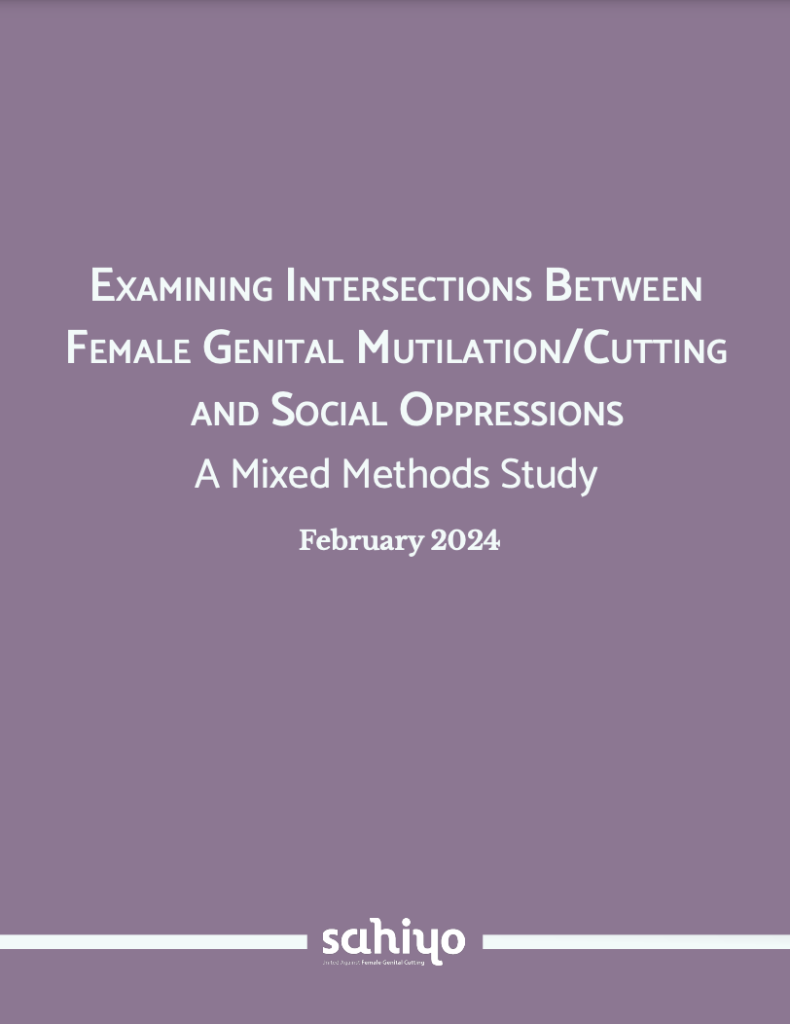
Sahiyo U.S. is excited to announce the publication of Examining Intersections Between Female Genital Mutilation/Cutting And Social Oppressions: A Mixed Methods Study, the second of three reports from our Critical Intersections Research Project. Inspired by our 2021 webinar, and building upon themes derived from our initial body of work released in 2023, this new report is based on original research from a mixed-methods survey with over 100 respondents, including individuals and organization that work within and beyond the FGM/C sphere. We are proud to share this report on February 6th, International Day of Zero Tolerance for FGM/C, as part of our survivor and advocate-led original research project. The report examines two main forms of oppressions intersecting with FGM/C: systemic forces, including discrimination within institutions, as well as interpersonal and communcal factors, such as discrimination within practicing communities and the anti-FGM/C movement itself. This body of work also identifies challenges and opportunities for cross-collaboration with other social justice movements and provides recommendations for how to implement this intersectional work. This research is meant to support advocates working in FGM/C to better understand how these intersecting oppressions affect the movement to end FGM/C, and connect fellow activists and social change makers to understand the larger forms of inequity at play and unite in ending these universally oppressive systems. We aim to strengthen anti-FGM/C efforts by addressing the roots of inequity and inequality and to create stronger collaborative movements across various human rights issues. Read the report here. Learn more about the Critical Intersections Research Project here.
Sahiyo publishes second report from Critical Intersections Research Project

Sahiyo U.S. is excited to announce the publication of Examining Intersections Between Female Genital Mutilation/Cutting And Social Oppressions: A Mixed Methods Study, the second of three reports from our Critical Intersections Research Project. Inspired by our 2021 webinar, and building upon themes derived from our initial body of work released in 2023, this new report is based on original research from a mixed-methods survey with over 100 respondents, including individuals and organization working within and beyond the FGM/C sphere. We are proud to publish this report, as part of a survivor and advocate-led original research project, on February 6th, International Day of Zero Tolerance for FGM/C. The report examines two main forms of oppressions intersecting with FGM/C: Systemic forces, such as discrimination within systems and institutions, included intersections between several forms of oppression such as xenophobia and racism with institutions like law enforcement. Many survey participants identified fear of the criminal justice system as a challenge for survivors and the end FGM/C movement; interestingly, a majority of every group reported to work with the legal system and law enforcement (in and beyond the FGM/C sphere). Interpersonal and communal forces, such as discrimination from within practicing communities and the movement to end FGM/C, introduced complexities for survivors and activists alike. Interestingly, individuals working in the FGM/C sphere most commonly identified interpersonal challenges (rather than systemic forces) such as gender discrimination and other forms of gender-based violence as challenges that girls and women in FGM/C-practicing communities face. Additonally, a strong discord around the framing of FGM/C (‘mutilation’ vs. ‘cutting’) suggested a significant barrier to collaborating within the FGM/C sphere and beyond. Lastly, the study examined the potential for cross-collaboration between the anti-FGM/C sphere and other social justice movements. Though participants reported an overwhelming desire for cross-collaboration across the demographic groups, they also identified many significant challenges for meaningful cross-collaboration. Participants also provided opportunities for collaboration. From the various challenges, opportunities, and intersections of oppressions, eight recommendations for cross-sector collaboration and intersectional work involving how to work toward ending FGM/C were gathered. This research is meant to support advocates working in FGM/C to better understand how these intersecting oppressions affect the movement to end FGM/C, and connect fellow activists and social change makers to understand the larger forms of inequity at play and unite in ending these universally oppressive systems. We aim to strengthen anti-FGM/C efforts by addressing the roots of inequity and inequality and creating stronger collaborative movements across various human rights issues. A special thank you to the Wallace Global Fund for funding this project! Read the full report here.
Grief to promoting education: Jacqueline’s inspiration to end FGM/C
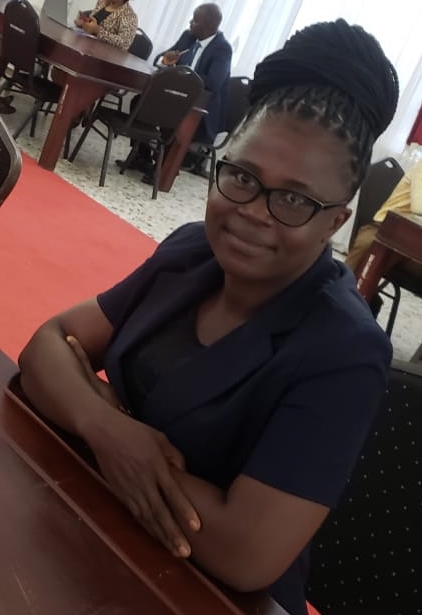
By Megan Seaver Jacqueline’s story with female genital mutilation/cutting (FGM/C) is one of both survival and advocacy. She works tirelessly to prevent other families from pressuring their daughters to undergo FGM/C, and the origins of her work are from her own insight after undergoing the practice herself. “Until age 7 on that day, I had two lovely childhood girl friends… We were meant to be mutilated on the same day. But me being the granddaughter of the cutter, they went through the exercise first… It ended up causing their death, because the bleeding from the cut began to spread.” Jacquline found it difficult to forgive her grandmother for her participation in carrying on the harmful practice. This loss of her friends and the disagreements with her grandmother allowed her to realize how dangerous FGM/C is. “Going through the practice of FGM/C [female genital mutilation] myself at a very early age and also seeing other girls go through it too, I know that pain that the cut causes. That is why I feel the practice must end with me, and a new generation must begin with me, so no one else feels that pain.” “I knew that it was my mission, to carry on this message to a wider audience. In spirit, in my community, and in my country. And to also save my girls from going through the same practice. I have three beautiful girls and none of them are taking the cut.” Jacqueline is the founder of the Covenant Foundation for Girls (COFGIRLS), The organization focuses on providing educational information about the dangers of FGM/C to young girls, and also goes to rural areas to create dialogues surrounding ending FGM/C. In 2010, Jacqueline and her team received a grant from Equality Now to support their educational efforts to visit villages to educate young girls and their parents about FGM/C. “So we were a team of seven persons… but four of my other teammates did not go through the practice, so they didn’t understand the [negative] response we would get when bringing up FGM/C in rural villages.” Taboos associated with speaking about FGM/C can make educational efforts difficult and conversations to end the practice were met with hostility; Jacqueline remembered in one village, choosing to stick up for her teammates, and taking responsibility for bringing up the topic of FGM/C in that setting. She pointed to the combination of a lack of education and the establishment of the practice within the rural communities that made this advocacy work so challenging. Jacqueline does not view FGM/C as “a cultural heritage that needs to be upheld.” Rather, she emphasizes a “need to have a national dialogue, to bring together stakeholders and chiefs” to work towards ending it. Years later, her activism led her to attend the 2023 Women Deliver Conference held in Kigali, Rwanda. At the conference, Jacqueline signed on as a founding member of the newly emerged End FGM/C Network Africa, an organization aimed at uniting voices of advocacy in the hope of influencing those in power to support the end of FGM/C in Africa. The future is bright for Jacqueline’s advocacy work. When asked about where to go from here, she mentioned the vital importance of educating men on the harm that FGM/C causes, and how their support of the practice in communities she works with has led to irreversible trauma for the women in their families and communities. “Everyone, especially parents of survivors, need to learn the truth about female genital cutting and help us to save our girls’ futures. FGM/C is cruel, deadly, and an abuse of human rights.”
Secrecy leads to the continuation of FGC in families and communities
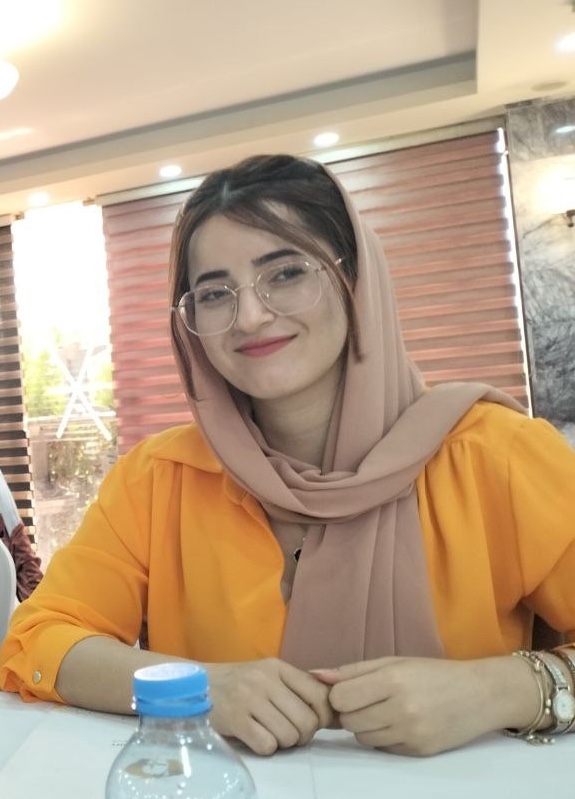
By Megan Seaver Bakhan is an activist and advocate against female genital cutting (FGC), and she is passionate about educating young girls on the topic. Bakhan also works as a Project Supervisor for Wadi, an organization promoting self-help programs in the Middle East such as monitoring and lobbying for citizen rights: rehabilitation projects for long-term prisoners, literacy programs, education and training for women, public awareness of and ending domestic violence as well as campaigns against FGC. Bakhan specifically assists in the organization’s programs to protect girls from FGC. I had the honor of interviewing Bakhan about her work and what inspired to get involved in work to end FGC. “I came to know FGC very late in my life, because I graduated college and I was searching for a job. So I was searching for a position as an English translator, and I came across this German organization called Wadi and they were working on FGC. I remember the first week when I was starting [at Wadi] and hearing about FGC and thinking I had never heard of it happening in my own community. It was really shocking for me to hear something like that.” “I started thinking about whether I had friends or family members that had gone through FGC without me knowing. I began asking people in my family and other people I knew if they had gone through the practice. And I learned that a lot of people in my life and my family and friends had undergone FGC.” “I learned that two of my cousins were mutilated. I remember being super young and we were in our grandmother’s house and two of my cousins went somewhere and came back and then I saw them go into another room and heard them giggling and I thought I was like an outcast. I was separated from them for some reason.” “I asked my mom about what happened to my cousins and how come it didn’t happen to me? She said your dad didn’t let them, he said that no one will hurt my girls.” “I was fortunate to have someone in my life and my family to protect me, but at the same time I was feeling very bad for my cousins.” Bakhan was the first of her family to not undergo the practice. Instead, she bore witness to her mother talking about her own experiences with FGC. “She said ‘I’m also mutilated,’ and I asked her ‘how do you feel?’ She said ‘I don’t think about it because it’s so common.’” Learning about her family’s history with the practice inspired Bakhan to dive deeper into her activism work. “The more I worked [to end FGC], the more I realized how unaware society is about the practice and how dangerous that can be.” “I have been working with Wadi for six years now, and I still believe that there will never be a point where I am not shocked by the stories I hear from survivors. We also do field visits and we go to the villages where FGC is still practiced, because in that society, especially in the cities, it’s not as common.” When I asked Bakhan about the impact of those visits, she told me of how deeply rooted the practice can be in the social norms of the communities. “I sit and talk with people and they still totally believe in the practice and they are proud of it and they are thinking of mutilating their daughters.” “My last experience with a field visit was a month ago. We went to a rural area and we were doing our normal seminars and there was a very young girl, almost the same age as me and she had a daughter and we were talking about FGC. At the end I asked her ‘do you still believe in FGM’ because I assumed that after the conversation we had that she wouldn’t. But she was so firm on her beliefs that FGC is good and should be done.” “If you stop working, the practice resurfaces. We always try to go back to those places after a couple of months or a year. We go back in order to find out whether they are doing it again or not. And sometimes we go there again, and they say they’ve stopped doing FGC because there was an organization coming and they knew it was us.” “[These conversations with villagers tend] to not be immediately welcoming because this is a sensitive topic. So we always make sure when we go that we don’t start with FGC. We try to talk about something related to it like other health issues.” Bakhan also spoke about the importance of involving community leaders, particularly men in the work against FGC, since they have more decision making influence in these societies. “We forget about the male position in this. Most of the time in our community men do not know about FGC. They are completely unaware of it and when you have a victim of FGC and they get married to a man and the man is dealing with a trauma which he does not understand, which creates issues within marriages. So we need to open the conversation to men.” In looking to the future, I thought it was important to ask Bakhan what advice she would give to her younger self and other girls. She said: “I want people to question more. I never asked why this is happening. Curiosity is something good to have. I think this is one of the things young people should always ask why things are happening, and I think that’s advice for myself, don’t go with the flow, ask questions. Know what you are getting yourself into.”
Activists Retreat Reflection: A shift that was needed
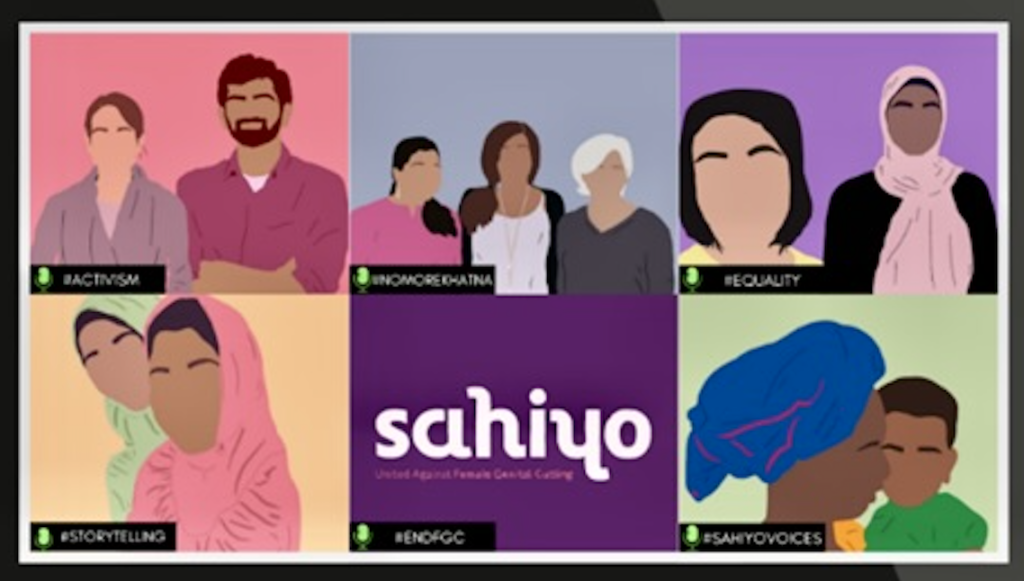
By Amena Ali This was my second time participating in the Activists Retreat, and my first Retreat on the planning committee. I thoroughly enjoyed this year, and especially the shift from last year compared to this year. Last year was very focused on people relating to each other in sympathy, and this year it was more about being able to release anger and your anger being validated. I think that shift is really nice to see, because it also portrays how far people have come, in regards to their process for coping, for accepting, and fighting against this. I was really lucky to be a part of that, and I hope in the future, we’re able to do this in person! Read Amena’s reflection on participating in the 2021 Activists Retreat here. Read the report on this year’s Activists Retreat.
UnChained At Last: The United States’ Child Marriage Problem webinar reflection

By Cate Cox On June 17th, UnChained At Last held their webinar, “The United States’ Child Marriage Problem.” Founded by a survivor of forced marriage, Fraidy Reiss, UnChained At Last is the only U.S.-based organization working to end forced and child marriages through direct advocacy and services. During this webinar, they explored their work and research into ending child marriage. At this event, they were joined by advocate Chelsea Clinton, author and influencer Blair Imani, bipartisan state Senators Julia Salazar (New York) and Katrina Shealy (South Carolina), Dr. Yvette Efevbera of the Bill & Melinda Gates Foundation, and survivor and advocate Patricia Abatemarco. Globally, 15 million girls are married before their 18th birthday. In a study conducted by UnChained At Last, they found that between 2000-2018 approximately 300,000 children were married across the United States, the majority of whom were underaged girls marrying adult men. The marriages documented involved girls as young as 10 years old. Also, 60,000 of all documented marriages involved a couple where the age difference between the two would constitute statutory rape if they were not married. Child marriage predicates a multitude of physical and mental health issues: abuse, lack of education, and poverty. Yet, public understanding of the severity of child marriage in the U.S. is very limited. Like many types of gender-based violence, including female genital cutting (FGC), child marriage in the U.S. is upheld through complicated systems of patriarchy, economic survival strategies, cultural norms, and legislative inaction. Both Senators Salazar and Shealy agreed that culture and shame are a major cause of the continuation of the practice. Within communities with a history of child marriage, many are unable to understand the multi-layered harms of this practice, and many survivors say their parents forced them into marriages to avoid communal shame from pregnancy or rape. These notions of shame and cultural necessity undermine many forms of gender-based violence, forcing girls to sacrifice their autonomy and future or risk ostracization. Yet, the thousands of girls forced into marriage across the U.S. are often unable to access support services to escape dangerous situations. Being underage, in many states, they cannot hire a lawyer, file for divorce, go to a domestic violence shelter, file a protective order, and other life-saving support systems if they become trapped in abusive situations. The irony of this is astounding, girls are old enough to be wives but not to be divorced. This loophole traps girls in cycles of violence and destroys families. At the beginning of this webinar, UnChained At Last shared their heart-wrenching video: The Girls You Have Destroyed, filmed by survivors of child marriage. By highlighting the stories of survivors (not unlike the Voices to End FGM/C videos by Sahiyo) they were able to show the real impact of this issue and highlight its deeply personal effects on women and girls. UnChained At Last staffers explained that they are working state-by-state to outlaw the practice of child marriage, since only five states including New Jersey, Delaware, Pennsylvania, Minnesota, and Rhode Island, have an outright ban on marriages involving persons under-18. There is no federal law against it. In order to push for legislative change, the approach of Sahiyo and other organizations to outlaw FGC in the United States mirrors that of UnChained At Last. Both are using a state-by-state approach, while simultaneously pushing for legislation at the federal level. While there is now a federal law, the STOP FGM Act of 2020, and 40 states with state-specific laws, it took the tireless work of activists across the U.S. to implement the most, seemingly inarguable, protections for girls against FGC. In better news, UnChained At Last found that the number of child marriages in the U.S. decreases every year. However, the speakers still stressed the continued importance of raising awareness about this issue. They highlighted that while U.S. foreign policy may condemn child marriage as a human rights abuse, we still allow it to be practiced on our soil. Speaker Blair Imani explained that the notion that child marriage is a “far away problem that requires faraway solutions” is one of the major barriers to addressing this issue in the U.S. While watching this webinar, I could not help but notice the similarities between the work to end child marriage and our work here at Sahiyo to end female genital cutting (FGC). From the intergenerational norms to the dismissal of the issue as a foreign phenomenon, the problems at hand are very similar. Both Sahiyo and UnChained At Last have struggled to make people aware of the severity of these issues within the U.S., and the urgency to address them. While discussing legislative action, one of the speakers in the UnChained webinar remembered speaking to a state legislature who told her, “Is it really that bad if a girl marries her rapist?” I was immediately drawn back to similar arguments advocates against FGC have heard such as, “It’s just a prick,” or, “It’s not that bad.” The severe harms caused by FGC and child marriage to women and girls are routinely dismissed, and survivors are left without support systems. At the same time both Sahiyo and UnChained At Last stress the importance of uplifting survivors’ voices, both for their personal healing and to create legislative change. Through tireless work, they and Sahiyo are making the world a safer place for girls, and are championing a world free of violence against women. You can watch the full webinar here: https://www.youtube.com/watch?v=xKlqmMqePks
Female genital cutting: A poem

By Zainab Khambata Country of Residence: India As the blade pierced through my skin, All I could feel was pain. I looked into my mom’s eyes, And she shrugged helplessly in vain. I was yet another girl, Subjected to female genital cutting. As a mere child of seven, I did not contest, I wasn’t even aware, That all my dignity as well as my rights, Were stripped from me bare. “It is done in the name of religion,” they said. And it is this ideology I dread. It is done to curb a woman’s desires, To subdue her voice and her fire. My grandmother said “It’s all right, all girls must go through this in their life.” Why has society rendered women unaware? To the point where they do not know and do not even care. They torment innocent children, With everlasting scars, But yet this practice they refuse to stop, Fearing from society’s eyes they will drop. When will this age-old tradition come to an end? So that without emotional trauma, The rest of their lives little girls can spend. It is time to speak up about this, And make people aware, It’s time to show that we care.
What I learned from survivors and advocates on my podcast about female genital cutting
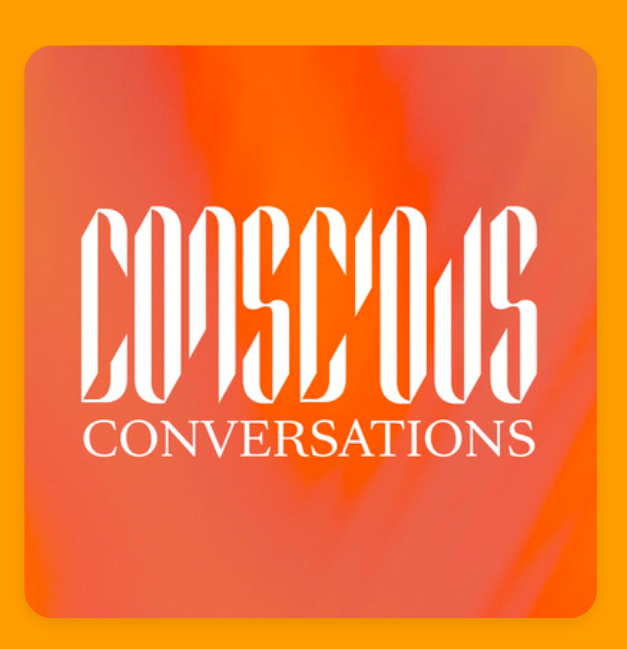
By Aubrey Bailey I graduated this April 2021 from Brigham Young University in Provo, Utah, with a Bachelor of Fine Arts in graphic design. For my senior capstone project I was instructed to choose a topic that I would stick with for a year and then conduct in-depth research, write a research paper, and display my findings visually through an exhibition. In April 2020, I went home to Gilbert, Arizona, to finish my winter semester under quarantine because of COVID-19, and while I was home my dad introduced the topic of female genital mutilation/cutting (FGM/C). I was dumbfounded that I had never heard of it before. I could not fathom that so many women were undergoing this practice in different parts of the world and I did not know about it. If I do not know about this, then who else does not know? Who does know? Who is taking action? I realized FGM/C was a topic about which I needed to learn more. I could not simply move on after understanding this information. Over the past year of my research on the topic, I became passionate about raising awareness of FGM/C, and also in advocating for women’s rights and raising awareness on violence against women. For my capstone project, I created a podcast to explain why FGM/C happens, to share women’s stories, to educate listeners on how to help, and to bring outside professional knowledge to help us better understand the topic. Through my research, I found Sahiyo–United Against Female Genital Cutting, and was impressed with their content and purpose. I reached out and asked if they would be willing to help me make this podcast possible. They were so gracious and introduced me to their network of individuals to ask if they would be willing to participate in my podcast. I was able to talk with some of the most incredible individuals and listen to experiences from people with different backgrounds. It was truly eye-opening and life-changing. I learned so much from my time interviewing everyone, and I am so grateful to Sahiyo for making it all happen. In addition to the podcast, I designed an exhibition displaying my research on FGM/C at Brigham Young University. For the exhibition, I created a poster series displaying facts about FGM/C by integrating a custom font that I created which has sharp characteristics throughout the posters. I also designed and installed a floral installation that symbolizes women. Flowers are beautiful and represent proud and glorious femininity and within the installation, each flower represents a woman. The hanging flowers represent women who have not been cut and the flowers on the ground represent the women who have been cut. Just because these flowers are not suspended from the ceiling does not lessen their value or their beauty in any way. They are still flowers but are just a little different. These women, like the flowers, are unique because they have been cut and have a piece of their body missing. But they are still just as powerful and beautiful. My hope through the exhibition was that individuals would feel moved to action and inspired to listen to the podcast to do their part in educating themselves and others on the topic to normalize the conversation so we can finally see it end.
Introducing Nala Feminist Collective: African Women and The 10 Demands, including ending female genital cutting
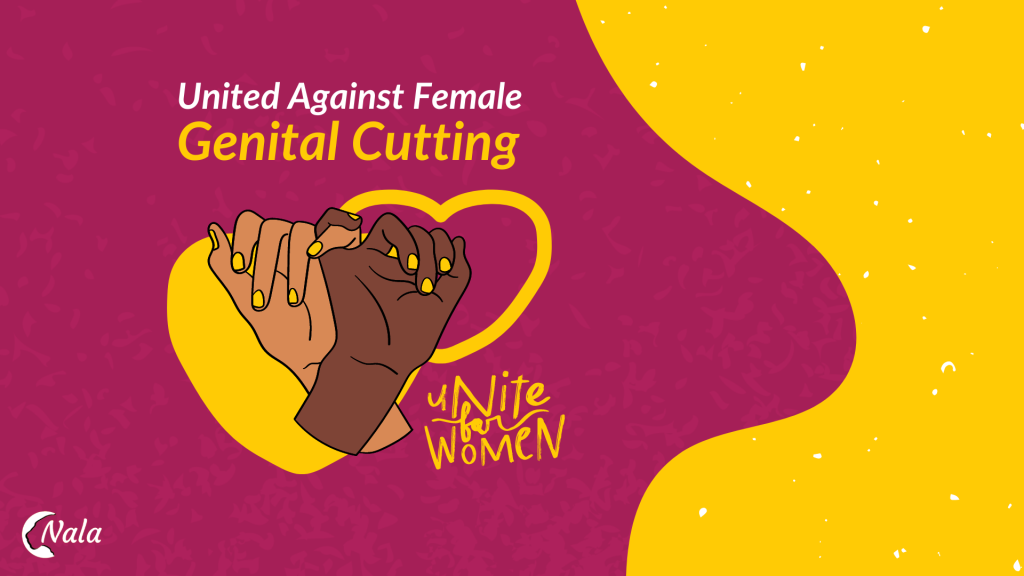
African women continue to struggle to find the right spaces to speak and share the realities of our generation. We do not lack bravery or confidence, but advocacy spaces that would engage our stories with kindness and actual solutions. Our feminist ancestors have taught us that what brings us together is our Pan-African solidarity. As African women, we will not allow anyone to keep us quiet. We know and recognize that the future cannot be just, peaceful and equal if young women and girls remain subject to gender-based violence such as female genital mutilation/cutting (FGM/C), other forms of domestic violence and femicide. Enough is enough. African women want and expect to be freed from the societal misconceptions which fuel the prevalence of FGM/C. It was groundbreaking to bring together 1,500 young people from across the continent during five Africa Young women Beijing + 25 virtual regional barazas (or convenings) hosted by the African Union Special Envoy on Youth, Aya Chebbi, in November 2020. The barazas opened up a space for sharing and speaking on the issues that challenge African women’s access and mobility spatially and socially. This was based on the premise that Africa’s women do not need anyone to speak on their behalf. They have voices and demands that must be heard and acted upon with the respect they deserve. The regional consultations culminated in the Africa Young Women Beijing + 25 Manifesto—a revolutionary feminist document that carries 10 bold demands. These are the hopes and aspirations that come to exist against sexist national laws, marginalization, and the lack of economic justice. As expressed by Africa’s young women, FGM/C remains a tool used to oppress their bodies—as an act of gender-based violence which many women have been forced to remain silent about for decades. Unlike other spaces, the manifesto was not built upon the problematic framing which discusses women’s issues without giving them agency. Instead, it was created through their inputs, generous sharing, radical honesty and listening. What about the other demands? FGM/C interlinkage with other forms of inequalities must be recognized. Each of the Manifesto’s 10 Demands provides an important roadmap to re-affirm that liberation pathways for young women are multi-layered and include demanding the provision of legal, physical and psychological support, shelters and specialist services to women subjected to all forms of violence, to demanding the removal of taxation on menstrual products, enforcement of progressive period policies in all workplaces, and the provision of free sanitary pads and sanitation in all schools. African women and the 10 demands: Economic Justice The Criminalization of Gender-Based Violence The End of Gender-Based Discrimination Access to Justice and Protection Sexual and Reproductive Health and Rights Mental Health and Well-Being Inclusive, Equitable and Quality Education Digital Justice Silencing the Guns Intergenerational co-leadership What binds the manifesto together is an equitable desire to center women’s voices within policy and decision making spaces in which they are absent— an absence that can be deemed violent. These are spaces in which African women are being spoken for, without inclusion. The Generation Equality Forum in Paris provides us, as the Nala Feminist Collective, with a unique opportunity to advocate for the implementation of these 10 demands. We are powered by African women’s words with a document that unites our voices, across urban and rural, online and offline spaces. Our Nala Council is made of 17 feminists with a mission to foster, enable and mobilize young women from Africa and the diaspora, bridging the gap between policy and implementation, intergovernmental and grassroots organizations, as well as generational spaces. Together—not without Africa’s young women. Join our advocacy. We have launched our 10,000 Signature Campaign. We need your support. The fight cannot be solo. Lend your voice to African young women and sign the Manifesto.
Women should not be harmed because of societal norms
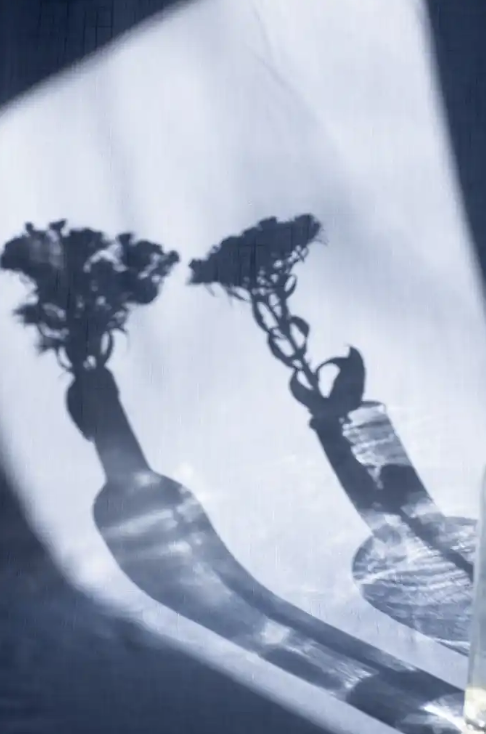
By Sakshi Rajani Age: 17 Country: India Female genital cutting (FGC): the term sounded ruthless the first time I heard it. It was not long ago that I was introduced to this term. While going through my Instagram feed, I read a story about a law student who was spreading awareness about FGC, and I was clueless about what it was. Immediately I searched this issue online and learned how serious it was. Then, I pondered why I hadn’t known about it earlier. Why had no one around me talked about it? Upon researching it further, I came to know how deeply rooted this problem was in communities and cultures. My will to do something to end it became stronger. I looked for organisations working to end FGC and came across Sahiyo. I soon joined the organisation. The first time I spoke about FGC to my friends they said, “What is that?” I wasn’t surprised by their reaction because I, too, was unfamiliar with it. I asked them to research it on their own, and then I explained more about the harms. I told them the World Health Organization and the United Nations declared FGC a human rights violation. Then I introduced them to the groundbreaking Mumkin app created by two co-founders of Sahiyo, Priya Goswami and Aarefa Johari, where my friends could learn more valuable information about this issue. What are the hurdles in encouraging abandonment of or ending FGC? FGC is also often seen as a necessary ritual for initiation into womanhood and can be linked to cultural ideals of femininity, purity and modesty. A strong incentive to continue the practice is family pressure to adhere to conventional social norms. Women who break from this social norm can face condemnation, abuse and rejection from family or community members. Patriarchal society can help perpetuate it generation after generation. Female genital cutting should stop immediately, as a woman should have full rights over her body and no woman should be harmed because of societal norms and expectations. I am now an advocate to make sure FGC ends.
